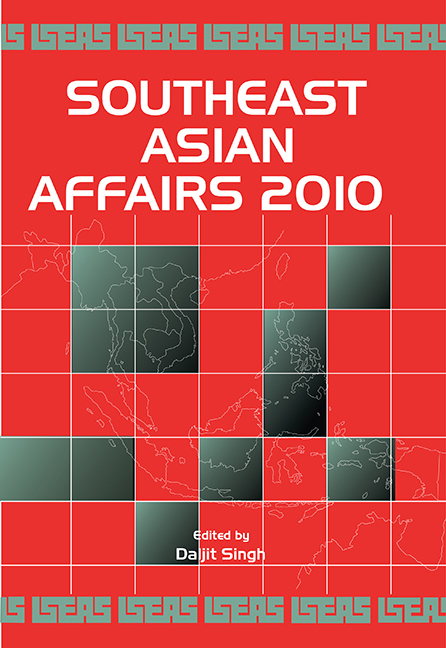Book contents
- Frontmatter
- Contents
- Foreword
- Introduction
- THE REGION
- Southeast Asia in 2009: A Year Fraught with Challenges
- Review of Southeast Asian Economic Developments
- The United States and China in Southeast Asia: Conflict or Convergence?
- The Year in ASEAN: The Charter, Trade Agreements, and the Global Economic Crisis
- BRUNEI DARUSSALAM
- CAMBODIA
- INDONESIA
- LAOS
- MALAYSIA
- MYANMAR
- THE PHILIPPINES
- SINGAPORE
- THAILAND
- TIMOR-LESTE
- VIETNAM
Southeast Asia in 2009: A Year Fraught with Challenges
from THE REGION
Published online by Cambridge University Press: 21 October 2015
- Frontmatter
- Contents
- Foreword
- Introduction
- THE REGION
- Southeast Asia in 2009: A Year Fraught with Challenges
- Review of Southeast Asian Economic Developments
- The United States and China in Southeast Asia: Conflict or Convergence?
- The Year in ASEAN: The Charter, Trade Agreements, and the Global Economic Crisis
- BRUNEI DARUSSALAM
- CAMBODIA
- INDONESIA
- LAOS
- MALAYSIA
- MYANMAR
- THE PHILIPPINES
- SINGAPORE
- THAILAND
- TIMOR-LESTE
- VIETNAM
Summary
Introduction
For Southeast Asia, the past twelve months have proven eventful on several counts. At the positive end of the spectrum, the region managed to weather the economic storm caused by the global credit crunch by minimizing its corrosive effects on local economies and populations, in no small part due to lessons learnt from the economic crisis of a decade ago. Meanwhile, advances were made in regional integration, culminating in the formation of the ASEAN Intergovernmental Commission on Human Rights, while anxieties over American commitment to Southeast Asia — an issue which seized regional leaders for the most part of the administration of George W. Bush — were soothed somewhat with Washington's signing of the Treaty of Amity and Cooperation. On the other hand, the past year also witnessed severe strains on several bilateral relationships among Southeast Asian states, the postponement of an ASEAN Summit under dramatic circumstances, and the emergence of new conceptions of regionalism that threaten to displace ASEAN, along with its norms and values, as the core of multilateral initiatives in the Asia-Pacific region. These developments are likely to evolve further in the coming years, with both positive and negative implications for the region.
ASEAN
The monumental signing and ratification of the ASEAN Charter by ASEAN members in 2008 committed the regional organization to two summit meetings a calendar year instead of the previous practice of one summit over a twelve month period (from mid-year to mid-year). However, in order to facilitate the transition to the new schedule with minimal disruption, the appointed ASEAN Chair for the year of 2008 was to hold that position for eighteen months instead of twelve, during which time it would host a total of three summit meetings along with the accompanying ASEAN Plus Three and East Asian Summit gatherings. By way of alphabetical rotation, Thailand succeeded Singapore as the ASEAN Chair in 2008. On the surface, it seemed like a routine transition from one core founder member to another. What transpired during Thailand's tenure, however, was anything but routine.
- Type
- Chapter
- Information
- Southeast Asian Affairs 2010 , pp. 3 - 22Publisher: ISEAS–Yusof Ishak InstitutePrint publication year: 2010

